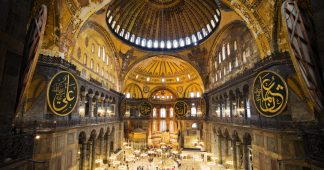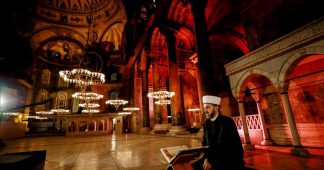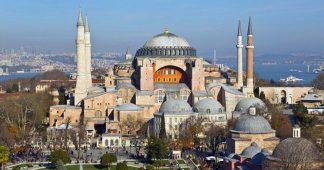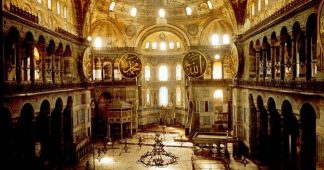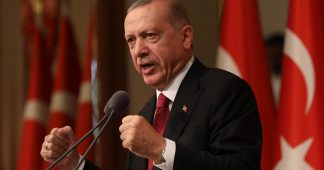Erdogan and the Hagia Sophia: Will He – Or Won’t He?
Facing ever shakier voter support, Turkish President Recep Tayyip Erdogan may finally be ready to convert the Hagia Sophia into a mosque.
Ever since the rise of his Islamist-rooted Justice and Development Party (AKP) to power in 2002, Recep Tayyip Erdogan has refrained from publicly endorsing calls for converting Hagia Sophia from its current status as a museum into a mosque.
While he is certainly sympathetic to this particular cause cherished by Turkey’s Islamists and ultranationalists alike, Erdogan — first as prime minister and then as president — generally acted with circumspection.
His more recent calls within the last two years to turn the Hagia Sophia into a mosque were either ploys to gain political ground or divert public attention away from his political failures. Erdogan’s latest push, however, may be different.
The historic background
Hagia Sophia was built as an imperial cathedral by the Byzantine Emperor Justinian in the 6th century.
Ottoman Sultan Mehmet II’s conversion of Hagia Sophia into a mosque right after his conquest of Istanbul in 1453 was the most potent symbolic act of domination of a Muslim empire over its Christian subjects.
When Mustafa Kemal Ataturk, the founder of the Turkish Republic, transformed the mosque into a museum in 1934, it was an equally significant symbolic act. It underscored the young republic’s secular principles.
Erdogan’s conversion of Hagia Sophia into a mosque would be his boldest statement to this day against Turkey’s secular republican tradition.
Why this time may be different
Until 2019, Erdogan kept a strategic silence about his real intentions about Hagia Sophia.
It was only when he realized that he was about to lose Istanbul to Ekrem Imamoglu, the rising star of an emerging opposition bloc during last year’s municipal elections and today its mayor, that Erdogan expressed his intent to reopen Hagia Sophia as a mosque.
His ploy failed to stop the opposition’s victory. At the time, the Turkish president did not take any steps to fulfil his promise.
This year, Hagia Sophia was at the very heart of the annual celebrations of Istanbul’s conquest on May 29. Erdogan took a prominent role in the ceremonies: He virtually appeared on a giant screen in Hagia Sophia next to an imam reciting Quranic verses and delivered a spirited speech broadcasted live.
The Turkish president’s appearance in Hagia Sophia — albeit virtually — during the conquest festivities likely marks yet another significant turn in the monument’s turbulent history.
The euphoria of Erdogan’s Hagia Sophia stunt created a buzz on social media. An opinion poll commissioned by the Turkish president showed that there was strong support, especially among his own electoral base, for converting Hagia Sophia into a mosque.
A matter of national sovereignty?
In early June, during an appearance on a TV show, Erdogan was asked to respond to Greece’s reaction to his threats of converting Hagia Sophia into a mosque. In his trademark style, the Turkish president burst out, “They dare telling us not to transform Hagia Sophia into a mosque. Are you ruling Turkey — or are we?”
Erdogan thus framed the issue as a matter of national sovereignty. He continued by proclaiming that the Turkish courts will make the final decision on Hagia Sophia’s status on July 2, and that the Turkish government would proceed according to that ruling.
The court case being decided
Erdogan’s statement is a reference to an ongoing legal case that a private association brought to Turkey’s Council of State to open Hagia Sophia for Islamic prayers.
Back in 2005, the same court had denied a similar case demanding Hagia Sophia’s transformation into a mosque. However, there is now a worrying legal precedent to be concerned about.
In 2019, the court ruled in favor of revoking the museum status of Chora, a Byzantine church in Istanbul that shared Hagia Sophia’s fate of conversions first into a mosque and then into a museum.
The AKP government converted Hagia Sophia’s namesakes in Iznik and Trabzon into functioning mosques in 2011 and 2013, respectively, after serving as museums for decades. From a legal perspective, Hagia Sophia’s status as a museum is more precarious than ever.
In the days following the celebrations of Istanbul’s conquest, Erdogan ordered his aides at a central executive committee meeting of his party to start devising a plan for changing Hagia Sophia’s status.
Erdogan’s conversion timetable
On June 16, Erdogan discussed with his Presidential Advisory Council plans to hold the first prayers at Hagia Sophia on July 15, shortly after the Council of State ruling expected on July 2.
The Turkish president’s target date, July 15, is the anniversary of the failed-coup attempt of 2016 and is monumentalized each year. Opening Hagia Sophia for worship on this day would make an equally monumental statement.
Over the course of his nearly 18 years in power, Erdogan has never stated his intentions to open Hagia Sophia as a functioning mosque as clearly as he did over the last few weeks.
And he has never before followed up with necessary administrative steps to make this transition a reality.
The museum’s end?
Given the latest push by Erdogan, who is now armed with legal precedents, Hagia Sophia’s conversion into a mosque is increasingly likely.
So far, the alluring prospect of converting Hagia Sophia has served Erdogan well to divert the attention of his voter base away from his political and economic failures.
Conclusion
By the same token, Erdogan’s readiness to fire his one silver bullet by converting the Hagia Sophia to save the day is a clear sign of the severity of his current political predicaments.
Sadly, Erdogan no longer has any competent counsel among his narrowing circle of yes-men to warn him that his move on the Hagia Sophia will create more problems than the ones his ill-advised step would purportedly solve.
This latest move in Erdogan’s ongoing culture war will further polarize Turkey’s deeply divided society while continuing to drift the country away from the West — both politically and economically.
As has been the case in other policy areas, the odds are that Erdogan will make a move that purports to be dynamic and decisive, but in reality only digs him deeper into trouble.
